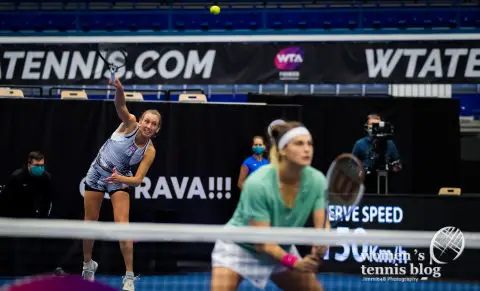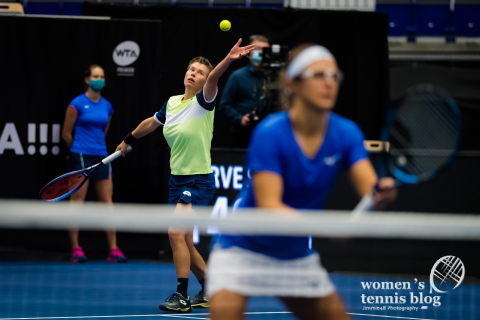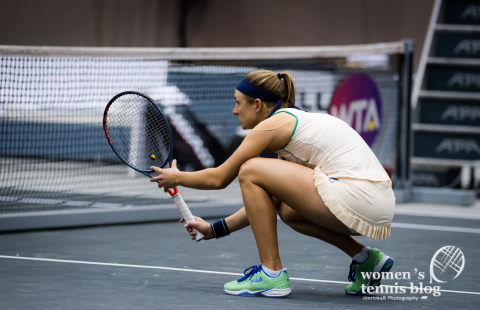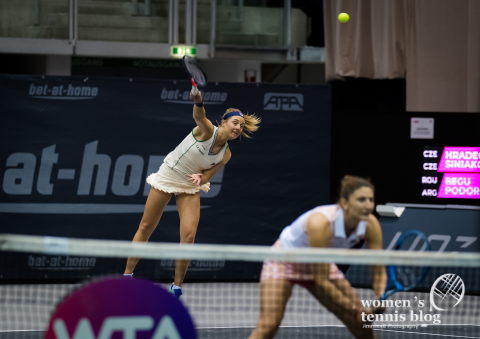In this month’s Tennis Tips guest post, coach Marcin Bieniek, founder of Enjoy Tennis Blog, explains the tactics behind the down-the-line return in doubles tennis.
 The doubles format is a great way to improve a variety of skills that are not the focus of singles tennis. Because of the pressure of the net player in doubles, returns are more difficult to hit, so players should be aware of effective ways to respond to their rivals’ serves. One option is to hit the ball down the line.
The doubles format is a great way to improve a variety of skills that are not the focus of singles tennis. Because of the pressure of the net player in doubles, returns are more difficult to hit, so players should be aware of effective ways to respond to their rivals’ serves. One option is to hit the ball down the line.
Different tactics in singles and doubles
Players tend to think that doubles tennis is easier than singles because there are more players on the court and less open space to hit winners at. From the physical perspective for most players, doubles will be less demanding. However, at the top level, players maintain high-intensity of the same or even higher value than in singles. From the mental perspective, we should be aware that less space on the court and the net player constantly looking for an opportunity to poach are two factors that are not present in the individual format of tennis. That is why four players on the court feel more stress.
 Every point starts with serve and return. In doubles, the technical skill of returning has to be high, because without control, the net player will always intercept the ball and hit it offensively to win the point in the easiest possible way. Additionally, even while possessing good technical preparation, players who don’t realize the differences between returning in singles and doubles will not play effectively and will have problems breaking the opponent’s serve. Especially at faster surfaces and higher level of performance, effective returns should be a priority during practice sessions.
Every point starts with serve and return. In doubles, the technical skill of returning has to be high, because without control, the net player will always intercept the ball and hit it offensively to win the point in the easiest possible way. Additionally, even while possessing good technical preparation, players who don’t realize the differences between returning in singles and doubles will not play effectively and will have problems breaking the opponent’s serve. Especially at faster surfaces and higher level of performance, effective returns should be a priority during practice sessions.
How and why to hit a down-the-line return in doubles
In singles, a cross-court return is used really often because it is a safe direction that offers many tactical benefits. In doubles, a good cross-court return, especially into doubles alley, can give you tactical advantage, but a little mistake with control can result in the net player hitting an easy winner out of the air. Top doubles players understand this and that is why they don’t hesitate to hit the ball down the line even when the net player knows where they are going to hit. However, a down-the-line shot shouldn’t be predictable, because predictability gives comfort to the opponent. If you want to return effectively into the direction where the net player stands, you have to apply various approaches.

Hitting into the doubles alley
This is one option that can force the net player to make a mistake or deliver quite an easy shot. By aiming at the additional playing zone, players put the net player in defensive mode and also limit their offensive possibilities to hit volley with an angle that will be difficult to reach. It is important to balance power with precision, because even a slight mistake with a late point of contact will result in the ball landing outside the alley.
Hitting into the body
Some players see this shot as unfair, but there is nothing wrong with the tactical decision that forces the opponent to be in a deep defensive position. Hitting the ball hard into the opponent’s body will make response really difficult to achieve, so the player will have to quickly react with a defensive shot to stay in the point. Of course, we shouldn’t aim at the face of the player, but rather at their waist level to check their physical and technical adaptations under the pressure of time.
 Hitting over the head of the net player
Hitting over the head of the net player
Lobs are not limited just to baseline rallies. When you return in doubles, it is a smart move to surprise the net player with a lob shot. It doesn’t only make the server run to the opposite corner and be in a difficult position on the court, but it also provides a great opportunity for the returning team to come to the net and put more pressure on rivals with the next shot. A topspin lob is much more effective than a slice lob, but against a good first serve players can achieve better control over backspin than topspin.
Doubles is a great game at all levels. Some players use doubles to make money, while others use this format to have fun and socialize. During the match you should think about possible decisions that will increase your chances of beating the rivals, so starting from serve and return you have many opportunities to improve your quality and put opponents into a more difficult position. And remember — don’t be afraid of the net players, they are not the danger. Your wrong decisions are!
Visit our Tennis Tips page for a lot more articles by tennis coaches. There you can learn how to improve specific shots and skills, handle pressure, adapt your game to all surfaces and weather conditions, choose the best tennis racquet, and much more.




